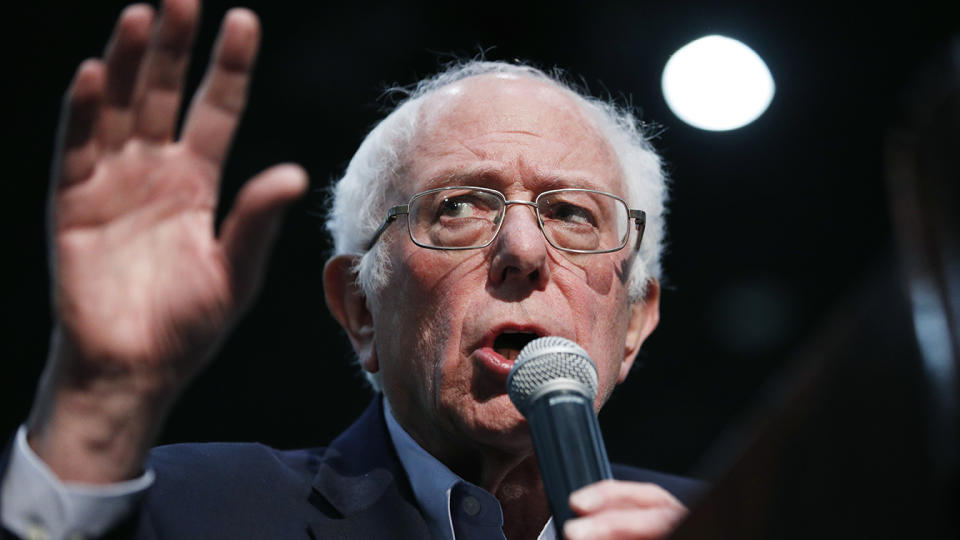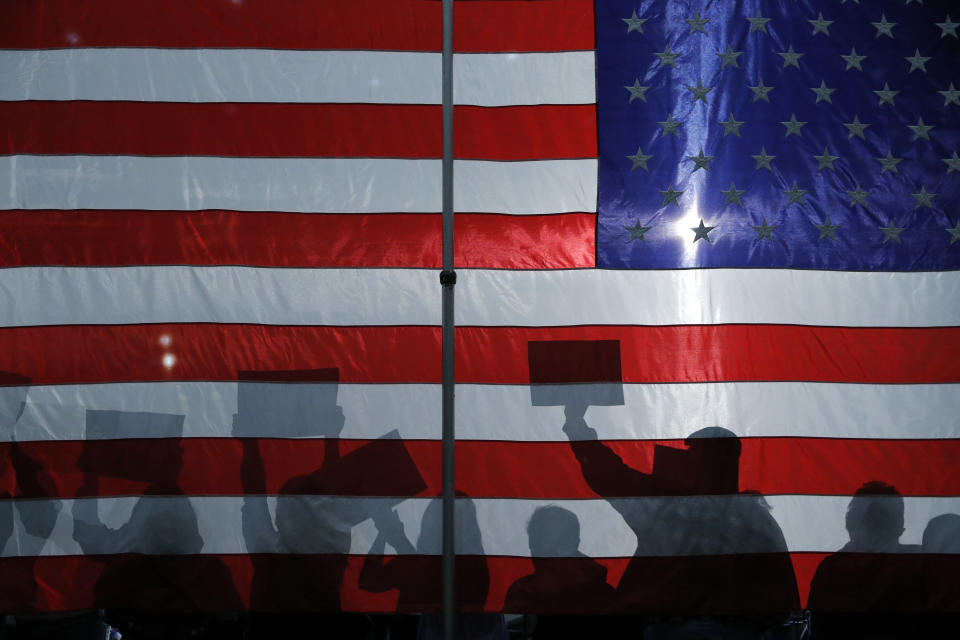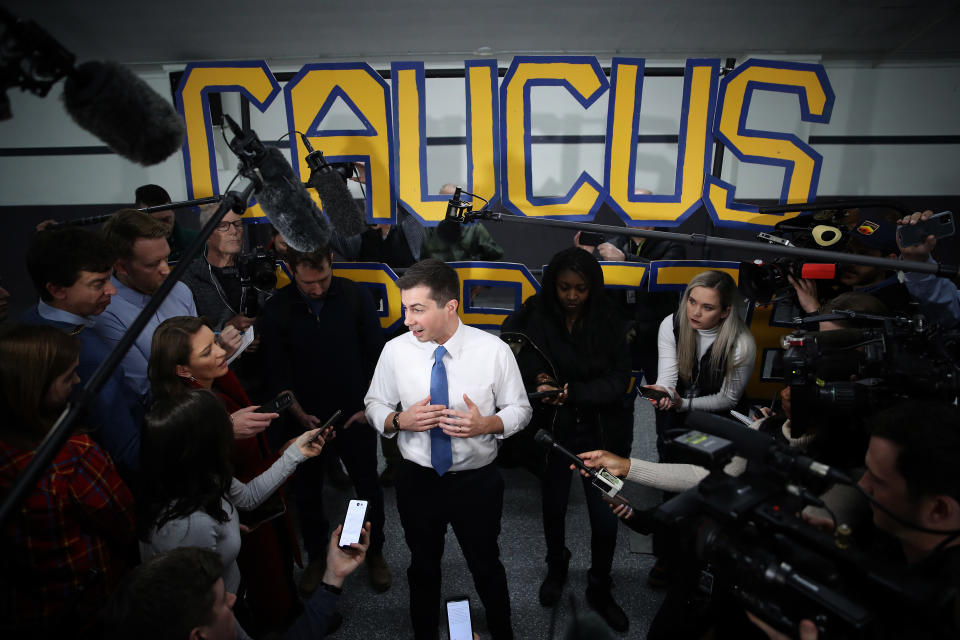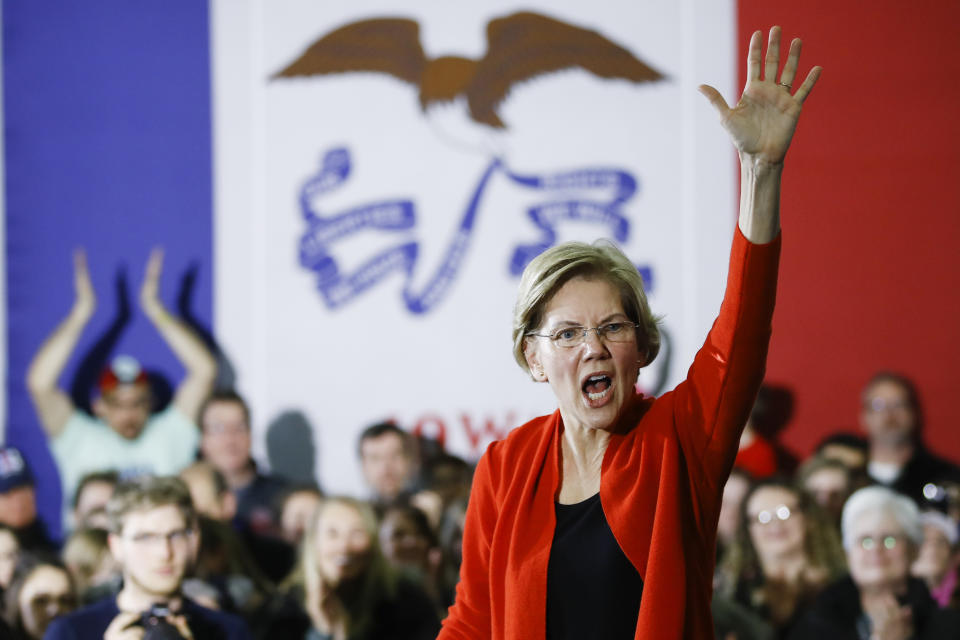As Sanders pulls ahead in Iowa, rivals scramble for 2nd place
Welcome to 2020 Vision, the Yahoo News column covering the presidential race with one key takeaway every weekday and a wrap-up each weekend. Reminder: There are seven days until the Iowa caucuses and 281 days until the 2020 election.
After more than a year of stumping and spinning and sniping and speculating, actual Democrats are finally about to vote on their party’s presidential nominee.
Or, to be more precise, they’re about to caucus.
The distinction is key. In one week’s time, hundreds of thousands of Iowans will brave the winter weather to assemble at their local school gymnasium or community center. There, they will stand in their favorite candidate’s corner and be counted. If fewer than 15 percent of their neighbors join them, however, that candidate will be eliminated, and his or her supporters will be urged to “realign” with one of the candidates who did clear the 15 percent threshold, a process that could take hours.
Statewide, whoever ends up with the most votes after realignment wins the caucuses — and the lion’s share of the media attention heading into the following week’s New Hampshire primary.
So who’s going to win Iowa?

This past weekend was the most consequential yet. Three polls showed Vermont Sen. Bernie Sanders seizing the lead in the Hawkeye State — one by 7 percentage points, another by 9. A barrage of “Bernie is the man to beat” headlines — and attacks from his Democratic opponents — followed.
Former South Bend, Ind., Mayor Pete Buttigieg submitted to a second Fox News town hall, where he sought to convince disaffected moderates and “future former Republicans” that he would be a better bet to beat Donald Trump in November than former Vice President and longtime national frontrunner Joe Biden.
Minnesota Sen. Amy Klobuchar got some good polling news of her own when an Emerson College survey released Sunday showed her “near[ing] viability” with 13 percent of the vote.
And Massachusetts Sen. Elizabeth Warren, who has been falling in the Iowa polls, caught a lucky break Saturday night when she landed the coveted endorsement of the Des Moines Register, the state’s dominant newspaper.
A lot could still happen between now and Feb. 3. Here are four things to watch in the homestretch.
Will Sanders voters show up?

The Iowa polling averages clearly show that Sanders has surged into first place. RealClearPolitics shows the Vermonter climbing more than 7 points over the last week and passing Biden on his way. Right now, according to RCP, he leads with an average of 25 percent of the vote (to Biden’s 23, Buttigieg’s 17 and Warren’s 13.5). The FiveThirtyEight average also puts Sanders on top.
But Sanders’s Iowa strategy — and indeed, his entire presidential campaign — is premised on a yet-unproven hypothesis: that he can turn out nontraditional voters and ride their enthusiasm to victory.
“I will tell you this without a shadow of a doubt,” Sanders said Saturday in Ames, Iowa. “If there is a large voter turnout — if working people and young people come out in large numbers — we will win and win big.”
As the New York Times’ Nate Cohn notes, this is why some polls show Sanders with a large lead, while others — like a Suffolk survey released Sunday — still show Biden ahead. It’s all about which types of voters actually come out to caucus. And here’s where the differences between a caucus and primary could be key.
Typically, primary voters are older, more reliable party regulars. These folks are Biden’s bread and butter. According to the new Times/Siena College Iowa survey (released Saturday and run by Cohn), Biden is ahead by 8 percentage points among people who voted in the state’s 2018 congressional and local primaries.
But one-third of these 2018 primary participants told the Times they won’t be subjecting themselves to this year’s much more involved caucus process. Instead, Sanders leads Biden by 10 percentage points among self-reported 2016 caucus-goers. He leads by 5 points among those who said they were likelier than not to caucus in 2020. And he leads by 11 points among those who said they were “almost certain” to caucus.
Caucuses, in other words, are different from primaries. They tend to attract more passionate, and often disproportionately younger, participants, who don’t mind spending several hours standing and shuffling around in a cold gymnasium. If Biden can mobilize older, regular voters over the next week, he could still win. But if the Times/Siena poll is right and Sanders’s nontraditional voters show up next Monday, it might be too late for anyone to stop him.
Can Buttigieg beat Biden?

The previously little-known Buttigieg catapulted into contention last spring with a series of viral media appearances. His first Fox News town hall with anchor Chris Wallace was one of them. At the time, Buttigieg, now 38, was pitching himself primarily as a generational-change candidate with bold ideas for depoliticizing the Supreme Court, ending the electoral college and adding new states (D.C., Puerto Rico) to the union. Since then he has rebranded himself mainly as a Midwestern moderate who can bring the party and the country together.
So over the weekend he returned to Fox to showcase his makeover.
“This network is known for having a lot more conservative viewers, but I don’t think you have to be a Democrat to see what is wrong with this president,” Buttigieg said when Wallace asked how he would appeal to Republicans in the general election. “If you’re having trouble looking your kids in the eye and explaining this presidency to them, you have a choice.”
The idea was that by visiting “the lion’s den” and “performing well,” Buttigieg’s first congressional endorser told Politico, the former mayor was “affirming his validity as a national candidate who can beat Donald Trump.”
That theory is undercut by polls showing Biden way ahead on measures of electability. Which is where the unique nature of the Iowa caucuses comes in. According to the latest Times/Siena Iowa poll, Buttigieg is tied with Biden for second place at 23 percent — but he is second only to Sanders among Iowans who said they caucused in 2016.
It’s possible, then, that Buttigieg and Sanders could both beat Biden in Iowa, depending on who shows up. That would leave the two moderates to battle it out in New Hampshire and beyond (where they will also confront a late entrant, former New York City Mayor Mike Bloomberg — but that’s a story for another day).
Who knows how the caucuses will ultimately shake out. But if Buttigieg is going to upset Biden anywhere, Iowa is the place. His organization is vastly superior. He’s spending a lot more time in far-flung rural corners of the state, where fewer raw votes can net you a lot of delegates. His supporters are more enthusiastic. And the idea of an Iowa bounce — particularly for a candidate who is polling at only 7 percent nationally — is real.
Where do Klobuchar voters go?

As much as anyone else, Klobuchar — or rather, her supporters — could decide the final standings in Iowa. That’s because of the “realignment” that takes place after the first round of caucusing, when candidates with less than 15 percent support are eliminated and their supporters “realign” with their second choices.
The Minnesota moderate may be experiencing a bit of an uptick in her neighboring state as the caucuses approach; the latest Emerson poll shows her at 13 percent, a new high. But no other survey puts Klobuchar anywhere near the 15 percent threshold; on average, she’s hovering somewhere around 8.5 percent.
That’s not enough to win, or even to survive the first alignment. But it’s more than enough, theoretically, to swing the race to someone else in the second round. The question is where Klobuchar fans will go when they’re forced to realign.
The answer, according to the Times/Siena poll: mostly to Joe Biden. When voters were asked who they would support if they were left with only four choices — Sanders, Buttigieg, Biden and Warren — Biden was the overwhelming alternative choice of Klobuchar’s backers, with 55 percent. Warren received 18 percent.
It’s possible, then, that Klobuchar’s elimination could wind up pushing Biden past Buttigieg — and maybe even Sanders — on caucus night.
Does Warren have another comeback in her?

Once the Iowa frontrunner, the Massachusetts senator has slid into fourth place there amid post-Hillary Clinton concerns about whether a woman can win in November, especially one with Warren’s left-wing policy proposals. At 15 percent in the FiveThirtyEight average, Warren currently lags about 7 percentage points behind Sanders and Biden and about 4 points behind Buttigieg.
The good news for Warren is that on Saturday she scored the Des Moines Register endorsement — a coup that could very well boost her numbers. According to analyst Geoffrey Skelley, past presidential caucus candidates endorsed by the Register have gotten about a 4-point bump from where their polling average in Iowa was before the endorsement to how they ultimately fared in the caucuses. All six Democrats endorsed by the Register saw their numbers improve. And candidates like Warren who were polling below 20 percent in Iowa did even better, gaining 11 points between their pre-endorsement polling average and the final vote on caucus night.
Does this mean Warren will wind up with 26 percent of the vote next Monday? Not necessarily. Newspaper endorsements don’t matter as much as they once did, and Warren has already waxed and waned in Iowa. She may not have another comeback in her.
But there’s a good reason Warren did a little jig when told of the endorsement Saturday night. Her organization in Iowa may be even stronger than Buttigieg’s. Roughly 40 percent of likely caucus-goers still say they could be persuaded to back a different candidate. She is the second choice of more Iowans than anyone else. And with national pundits starting to count her out, a surprisingly strong showing could go a long way in upending expectations and propelling her campaign forward.
That said, Warren’s current polling average is right on the cusp: 15 percent. If she doesn’t improve, or slips further behind, she could suffer the same fate as Klobuchar. In which case, her supporters would mostly realign with Sanders — potentially giving him an even bigger boost than Klobuchar’s backers would give Biden.
Read more from Yahoo News:




